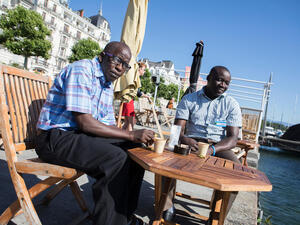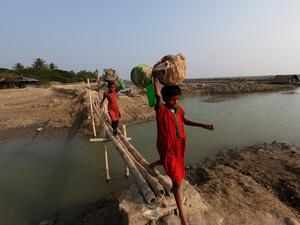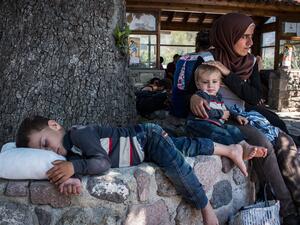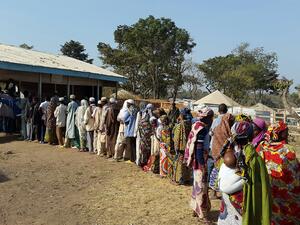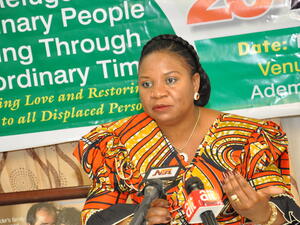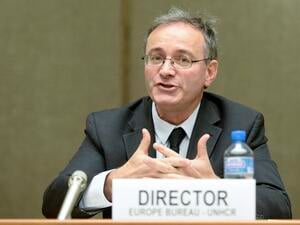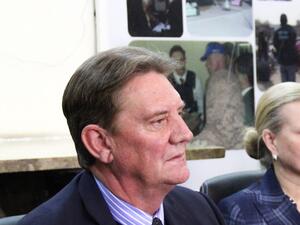Q&A: Film helps empower young Ugandan refugee in Kenyan camp
Q&A: Film helps empower young Ugandan refugee in Kenyan camp

Kate Ofwono in a Geneva park.
GENEVA, March 18 (UNHCR) - Kate Ofwono recently visited Geneva to join UNHCR events linked to International Women's Day. The 23-year-old refugee from Uganda took part in a panel discussion and presented a film she made about her life in Kakuma camp. She fled to the camp in north-west Kenya four years ago after her father was killed and her mother kidnapped in eastern Uganda. In Kakuma, the young woman became involved with the Nairobi office of FilmAid International, a New York-based humanitarian group that uses film and video to inspire the forcibly displaced and other vulnerable communities. It is also a UNHCR implementing partner in Kakuma. Ofwono sat down and talked with UNHCR's Helene Caux, a public information officer and professional photographer, about her life. Excerpts from the interview:
Why did you have to leave Uganda?
I left my country because of what happened to my parents for their involvement in politics. During the 2006 general election [the first multi-party election in 20 years in Uganda], I took part in the political campaigning and I felt a bit threatened. So when my father was killed and my mother kidnapped, I had to run away because I was involved with the opposition.
My father was in the Ugandan army . . . and he felt he was not trusted and people were accusing him of being involved with the [rebel] Lord's Resistance Army - something that he denied. But he did not feel any real threat before the day they came and killed him at home in Tororo, near the border with Kenya . . . I was at school and my cousin later told me that the people who killed my father and kidnapped my mother [whom Ofwono has not seen since] asked for me too. So I could not stay at home.
Where did you go?
The obvious thing for me to do was to leave the country. And since we lived near the border with [western] Kenya, I got my cousin to drive me to the border and I walked across, following the railway line as I did not want to go through immigration. In the town of Malaba, I stood outside a shop and cried. Somebody asked me what the matter was, and when I told him he said people could not help me in Malaba and I should go to the UNHCR office in Nairobi.
I had nowhere to sleep on my first night in Nairobi, so I just lay down in the street. A man came and beat me badly with his belt. He just left me there and I could not go to the hospital. It was dangerous sleeping out in Nairobi, but I didn't have any choice. The next morning, I asked a man for directions to UNHCR and he took me on a bus to the gates of the UNHCR building in Westland [district].
The staff asked me if I wanted to stay in Nairobi or go to a refugee camp. So I told them I could not chose, it was for them to decide . . . So they gave me a transport pass to the camp and I went to Kakuma.
Tell us about the camp and your thoughts at the time
I expected to go to a place full of tents and people looking miserable. On arrival, I thought, "This is going to be the end of me." The climate was bad; I was not used to that kind of heat. And then the food was not what I was used to at home, but I could not complain because everyone received the same.
But I was lucky to make some friends at FilmAid [very early on] and I met other people when FilmAid had screenings at the camp reception centre. Some of them were Ugandans and I explained my problems, including the fact that I needed a place to stay. One Ugandan family was being resettled [to a third country] and when they left, I moved into their house. I was lucky; I got a house among the Ugandan community.
What about your involvement with FilmAid?
One time they put up a notice in the camp asking for people to join the Participatory Video Project [PVP], which is run by FilmAid. So I applied and was selected. We were trained on basic camera operation, acting, editing, scriptwriting and directing. I was very interested in this and I really tried to do my best. I ended up among the best in that class. When a facilitator with PVP was resettled, I applied and got the job.
What do you like about the programme?
I like it because I get to help fellow refugees. I was trained and now I am training others. I feel I am being empowered. Through teaching others, you gain confidence. I am very proud because not so many girls get to do this. It is also a nice way to give back something. With FilmAid, I also made a short film about my life in the camp.
How is camp life? Do you feel safer now?
Definitely, but there are other challenges. Some of the local people feel that the refugees receive special treatment and that they have money . . . Also, in my community sometimes people brew alcohol and if these people, mostly men, get drunk, they try to grab passing girls or they wolf whistle.
What about the future?
I want to do so many things. I would like to go back to school; I would also like to do my music [Ofwono writes songs and is an excellent singer], which is a very big part of my life. And also, I want a family, to have a good life, many things!
What does March 8, International Women's Day, mean to you?
I believe Women's Day is a time for women to speak out for themselves and to be listened to and prove that they can do everything and anything.

